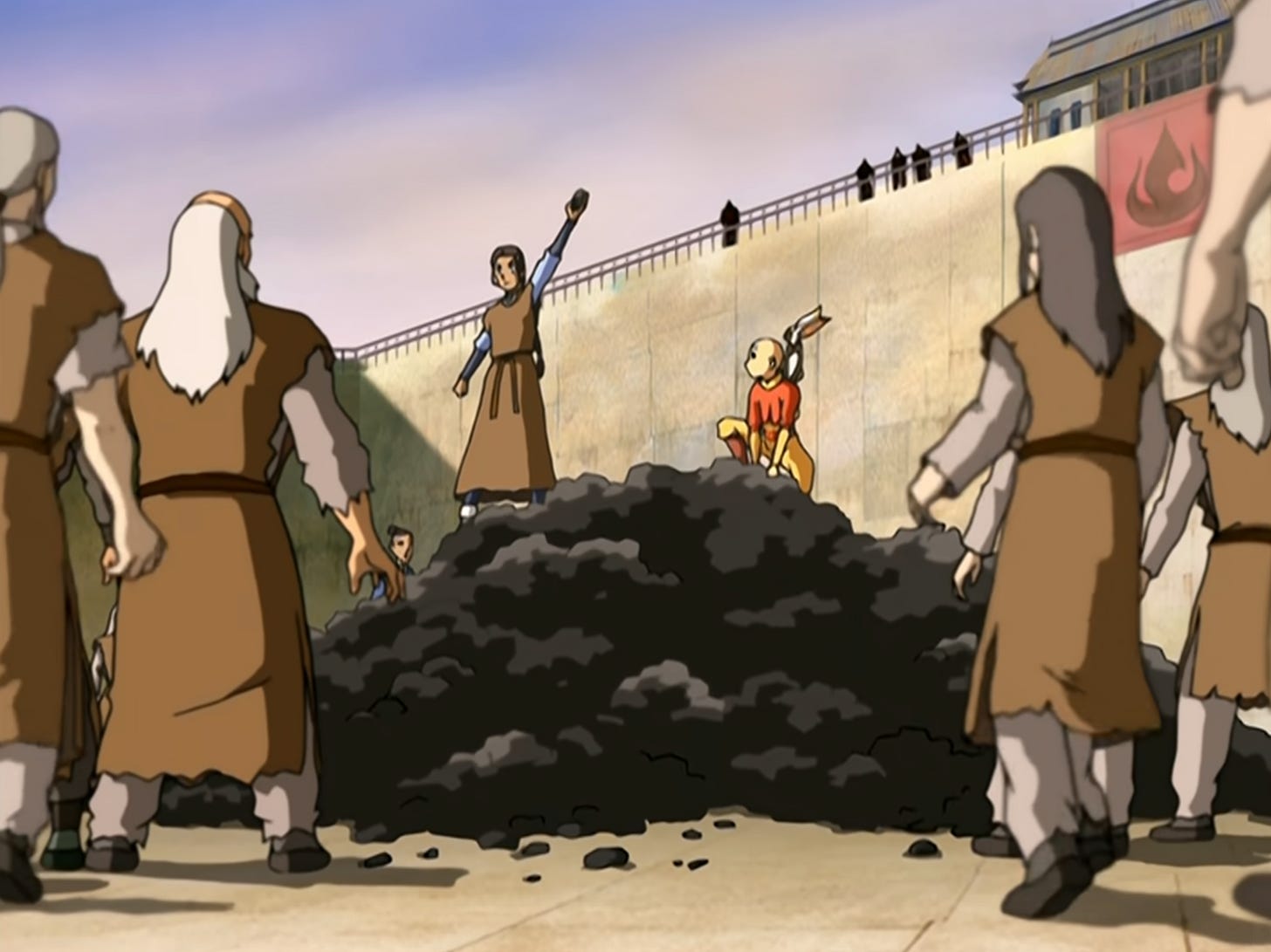Thanks for tuning in to my sixth of 61 daily reviews of Avatar: The Last Airbender! Yesterday, we watched S1E5: The King of Omashu.
For me, this is probably the most forgettable episode of Season 1, and perhaps the entire series. This episode seems to be establishing the ruthless and destructive imperialism of the Fire Nation, who we haven’t really seen interact with civilians except in Zuko’s haphazard attempts to capture Aang. So there’s a lot of cruelty in this episode that feels simultaneously watered-down and over-the-top: the army thugs who extort the villagers, the abduction of Haru’s father, the backstabbing old man who snitches on Haru for saving him. All of these injustices really happen in war, and worse, but this episode’s clumsy and rushed treatment robs them of their horror for the audience. For example, at the start of the extortion scene, Sokka instructs everyone to “act natural.” The comedic cut feels out of place, shattering the tension, and then the whole thing is over in less than twenty seconds.
Part of the problem here is Haru, whose character is not fleshed out enough to feel concrete, rendering him as something of a symbol. His personality is defined by his opposition to the Fire Nation, but it’s only conveyed through some passive-aggressive remarks and a brief anecdote about his father. Lacking charisma or much memorable dialogue, he just isn’t compelling enough to carry his weight here. This is the show’s first real “Katara episode,” and a stronger supporting character might have helped prevent her naive idealism from taking over the episode’s oversentimental morals.
She doesn’t understand the depths of the human instinct for self-preservation, coupled with the psychological wounds inflicted by war and colonial brutality.
Where the episode succeeds, and makes its most interesting points, is in its depiction of the broken earthbenders in the prison. Katara expects that a twee speech and the means to fight back will be enough to start an uprising. But she doesn’t understand the depths of the human instinct for self-preservation, coupled with the psychological wounds inflicted by war and colonial brutality. The demoralized earthbenders know that if they rebel and fail, they will certainly be killed. But if they remain passive, reject Katara’s call, then they may survive another day.
The earthbenders’ inaction recalls Hannah Arendt’s landmark report Eichmann in Jerusalem, in which she seeks to uncover why many Jews seemed to willingly go to their death instead of fighting back or fleeing during the Holocaust. Among other reasons, she found that they did not understand what awaited them. Already brutalized and traumatized, they did not imagine things could get worse. Jewish leaders knew the dangers of disobedience — indeed, “fifty percent of people who escaped were captured and killed.” But “ninety-nine percent [were killed], for those who did not escape.” We don’t know what’s in store for the captured earthbenders, but if the genocide of the Air Nomads is any indication, they may have less to lose than they expect.
Ultimately, only Haru has the courage to take a stand. At that point, the calculus changes for his father Tyro. He knows that Haru is dead if he doesn’t fight back, and win. He does, and they do, and suddenly the earthbenders decide it’s time to take back their town, and the Earth Kingdom. Maybe they’re inspired by the taste of victory, but the whole thing feels a little too cut-and-dry. What if Katara’s plan had failed instead, forcing the Gaang to flee and leaving Haru and company to an ominous fate? Perhaps a bit heavy for a kids’ show, but it might have lent some needed urgency to this episode’s message.
See you tomorrow for Episode 7: The Spirit World! Share your own thoughts on this episode in the comments.
Spare observations
Does Katara have a little crush on Haru? They share a moment when she tells him about her mother’s necklace. Anyway, she can do better.
That necklace? She somehow drops it at the prison, and it’s retrieved by none other than Zuko. In a show that prizes its continuity, we know that it will turn up again later.
The warden is just a comically evil caricature in a foolish way that robs him of any real gravitas. He sends a prisoner to a week of solitary confinement for coughing, and throws his own captain overboard over a trifle.
Friends of the White Lotus [SPOILERS]
Maybe Aang really did learn something from Bumi. His observation that the coal smog is really just earth is clever. This is the first of several moments in the series where the Gaang learns that opportunities for bending abound in surprising places. A few notable examples come about in The Guru, The Runaway, and most infamously The Puppetmaster.




